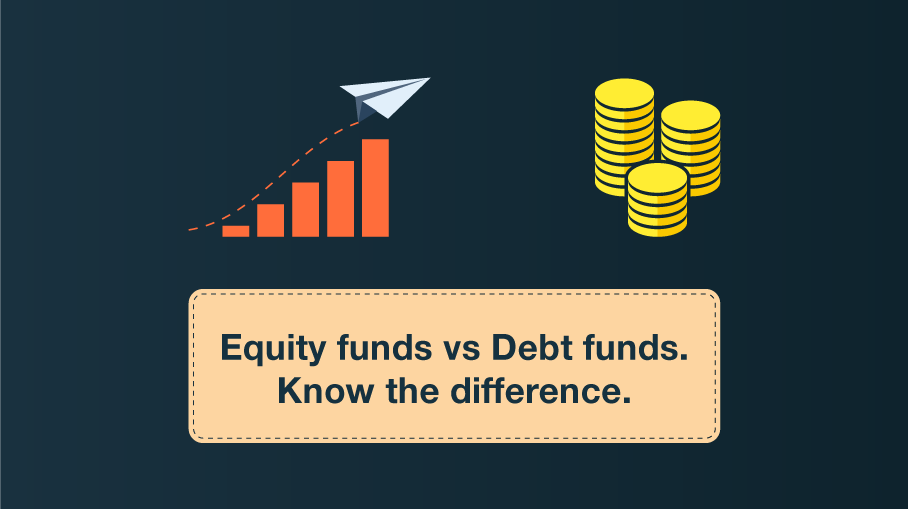Selecting the right mutual fund investment option for your portfolio can be a daunting task given the wide variety of categories. However, even before you choose an ideal mutual fund scheme, you must first ascertain whether you want to invest in equity funds or debt funds. Just like every investor is unique, so are their investment choices.
This article explains the key differences between equity mutual funds and debt mutual funds to help you make the right choice.
Debt v/s equity mutual funds
- Definition
Equity funds invest in stocks of prominent companies across varied industry sectors such as healthcare, FMCG, infrastructure and more. They tend to offer inflation-beating returns over long-term horizons. On the other hand, debt funds invest in fixed-interest bearing instruments, such as government securities, corporate bills, certificates of deposits, treasury bills, etc. They are considered a superior investment avenue compared to traditional forms of investment, such as fixed deposits and savings accounts.
- Investment goal
Investors invest in the equity market to accumulate wealth or create a substantial corpus in the long run. However, investors invest in debt funds to earn a regular income over a short period. Since debt funds are less volatile, there could be an added certainty of getting fixed returns.
- Investment horizon
Experts suggest investing in equity funds for a long-term tenure. This means seven to ten years or longer. Whereas, for debt funds, investors can invest for shorter durations i.e. five years or lesser.
- Returns
Since equity funds are more volatile, they tend to fetch higher returns to commensurate with the high risks. In the case of debt funds, the returns are lower as compared to equity funds. In the past, debt funds have offered returns around 9%, as opposed to equity funds around 15%.
- Risks
Equity funds are more sensitive to economic factors such as bank policies, inflation, currency fluctuations, tax rates, etc. Any market volatilities can have a direct impact on the Net Asset Value of the units. On the other hand, debt funds invest in fixed-income bearing instruments and are regarded as safer in comparison. However, they do carry credit and interest rate risk. It is best to check mutual fund ratings from credit rating agencies before you invest in debt funds.
- Taxation
Equity funds are subject to long term capital gains (LTCG) tax at 15% if capital gains exceed Rs.1 lakh in a year. Short term capital gains are taxable at 15%. For debt funds, LTCG is taxable at 20% after indexation, whereas short term capital gains are added to the taxable income and taxed as per the income tax slab.
Conclusion
Thus, if you wish to invest in mutual funds, you can consider both equity and debt funds to create a balanced portfolio and make the most of your investments. Based on your risk profile and investment horizon, you can keep rebalancing the equity and debt proportion of the assets to meet your financial objectives at the earliest.

Leave a Reply